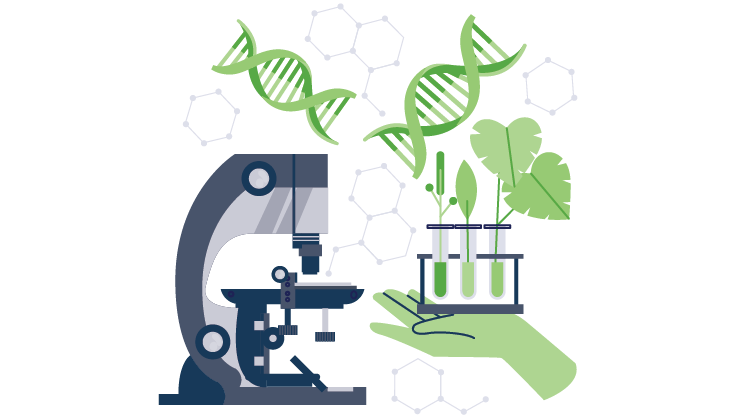Biology (Bio) 1 – Introduction to Biology
Biology
- Bio, the study of life and living organisms, is a fascinating and diverse field that encompasses everything from the tiniest microorganisms to the largest ecosystems. It delves into the complex mechanisms that make life possible, examining the structure, function, growth, evolution, and distribution of living organisms. This article explores the significance of studying biology, the major branches of the field, and the exciting career opportunities it offers.

Why Study Biology?
- Understanding Life Processes: Bio helps us understand the fundamental processes that govern life, from cellular respiration to ecosystem dynamics.
- Medical Advancements: Biological research is at the heart of medical breakthroughs, leading to new treatments, vaccines, and diagnostic tools.
- Environmental Conservation: Bio informs our efforts to protect endangered species, conserve habitats, and address environmental issues like climate change.
- Biotechnology and Agriculture: Advances in bio have revolutionized agriculture and biotechnology, improving crop yields, creating genetically modified organisms, and developing sustainable practices.
Major Branches of Biology
- Molecular Biology
- Focuses on the molecular mechanisms within cells, including DNA, RNA, and protein synthesis.
- Important for genetic research, biotechnology, and understanding diseases at a molecular level.
- Cell Biology
- Studies the structure and function of cells, the basic units of life.
- Essential for research in cancer, developmental bio, and regenerative medicine.
- Genetics
- Examines heredity and variation in organisms.
- Key to understanding genetic disorders, evolution, and the development of new biotechnologies.
- Ecology
- Investigates the relationships between organisms and their environments.
- Critical for conservation efforts, studying climate change impacts, and ecosystem management.
- Evolutionary Biology
- Explores the origins and changes in the diversity of life over time.
- Helps us understand the history of life on Earth and the mechanisms driving evolution.
- Physiology
- Focuses on the functions and mechanisms of living organisms.
- Important for medical science, understanding how organisms respond to their environments, and improving human health.
The Excitement of a Biology Career
- Research Scientist
- Conduct experiments and studies to advance our understanding of biological processes.
- Opportunities in academia, government agencies, and private industry.
- Healthcare Professional
- Utilize biological knowledge in fields such as medicine, pharmacy, and clinical research.
- Roles include doctors, nurses, pharmacists, and medical researchers.
- Environmental Scientist
- Work to protect and preserve the environment.
- Engage in conservation projects, environmental impact assessments, and policy development.
- Biotechnologist
- Apply biological principles to develop new technologies and products.
- Work in agriculture, pharmaceuticals, and industrial biotechnology.
- Educator
- Teach biology at various educational levels, from high school to university.
- Inspire the next generation of biologists and promote scientific literacy.
Conclusion
- Studying biology offers a window into the intricate and dynamic world of living organisms. It equips students with the knowledge and skills to address some of the most pressing challenges facing humanity, from health and disease to environmental sustainability. Whether you are passionate about research, healthcare, conservation, or technology, a background in biology opens up a world of possibilities.
Fundamental Concepts in Biology
Biology is built upon several foundational concepts that help us understand the diverse forms of life on Earth:
- Cell Theory: This concept states that all living organisms are composed of cells, which are the basic units of life. Cells carry out essential functions such as metabolism, growth, and reproduction. Understanding cell structure and function is crucial for studying more complex biological processes.
- Genetics: Genetics explores how traits are inherited from one generation to the next through genes. This field encompasses DNA structure and function, gene expression, and genetic variation, which are key to understanding inheritance, evolution, and genetic disorders.
- Evolution: The theory of evolution explains how species change over time through natural selection and adaptation. Charles Darwin’s work on evolution provides a framework for understanding the diversity of life and the mechanisms driving species development.
- Ecology: Ecology examines the interactions between organisms and their environments. It focuses on ecosystems, biomes, and environmental factors that influence the distribution and behavior of organisms. Ecology helps us understand ecological relationships and the impact of human activities on the environment.
Major Branches of Biology
Biology is a diverse field with several branches, each focusing on different aspects of life:
- Molecular Biology: This branch studies biological molecules, such as DNA, RNA, and proteins, and their role in cellular processes. Molecular biology is crucial for understanding genetic mechanisms, disease mechanisms, and biotechnology applications.
- Microbiology: Microbiology focuses on microorganisms, including bacteria, viruses, fungi, and protozoa. It explores their structure, function, and role in health, disease, and environmental processes.
- Botany: Botany is the study of plants, including their structure, function, growth, and classification. It covers plant physiology, ecology, and evolution, and has applications in agriculture, horticulture, and conservation.
- Zoology: Zoology deals with the study of animals, their behavior, physiology, and evolution. It includes areas such as ethology (animal behavior), comparative anatomy, and conservation biology.
Xem thêm video tại:
https://www.youtube.com/@learnabcacademy
Trang chủ LearnABC Education:
https://learnabcacademy.com/
Theo dõi thêm các bài viết tại:
https://huynhtrunutrition.com/
Hãy học cách phòng ngừa thay vì bệnh rồi mới tìm cách chữa trị. Tham khảo 2 tập của sách Ayurveda, link mua sách tại:
http://huynhtruayurveda.com

Câu hỏi thắc mắc, vui lòng liên hệ:
Facebook: https://www.facebook.com/LUYENPHATAM
No videos found





